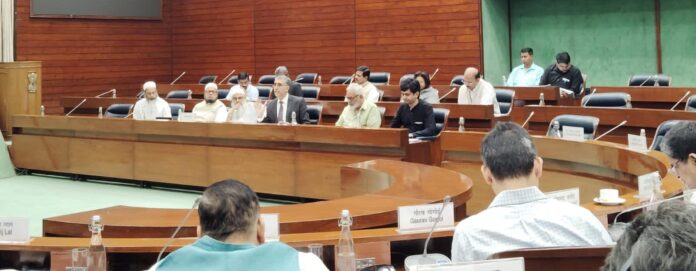
India Tomorrow
NEW DELHI: A delegation of the Jamiat Ulama-i-Hind (Mahmood Madani group) on Monday submitted its representation about the Waqf Amendment Bill 2024 before the Joint Parliamentary Committee headed by Member of Parliament Jagdambika Pal.
While raising objections to transfer all the powers of adjudication in waqf matters to the district collector by scrapping the waqf administrative tribunal and removing the ‘waqf by user’ provision from the waqf laws in the proposed Bill, the JUH rejected the Bill in its entirety and demanded its withdrawal even without discussion on it.
The delegation members said that the bill did not deserve even discussion because it was nothing but a document to destroy the existing Waqf boards and illegally grab Muslim waqf properties. The delegation submitted a 28-point representation strongly opposing the Bill in its present form.
The delegation informed the JPC that the bill was nothing but an instrument to deprive Indian Muslims of their religious places like mosques, dargahs, and graveyards which was a grave injustice. They pointed out that if the Bill comes into effect despite strong opposition by the Muslim community all over the country, there will hardly be any mosques left for use in India because the government would claim their land as the ‘waqf by user’ provision would not be applicable under the new laws if the Bill became law.
The delegation also said that the government has adopted different parameters while dealing with religious properties of Muslims under the waqf laws and Hindu religious assets under the Hindu Endowment Act. So, the proposed waqf amendment bill was discriminatory and aimed at grabbing Muslim religious properties through proposed changes in waqf laws. The delegation members said that it would be a great injustice to the Muslim community.
They also highlighted that while there is no provision in the Hindu Endowment Act to appoint a Muslim or a non-Hindu as member on the board of management committees of temples and other Hindu religious panels, the central government has brazenly made it mandatory to appoint at least two non-Muslims on the Central Waqf Council and state waqf boards which was totally unacceptable because the waqf is a religious matter and the non-Muslim members are not aware of the provisions of Islam. Moreover, non-Muslim members, even if they happen to be Islamic scholars, were not practicing Muslims, and hence, their suggestions and recommendations were Islamically not valid.
The delegation members included: Maulana Mahmood A. Madani, President, Jamiat Ulama-i-Hind(Mahmood group), Senior Supreme Court advocate Rauf Rahim, retired IRS officer Akramul Jabbar Khan, JUH general secretary Maulana Hakeemuddin Qasmi, JUH secretary Maulana Niaz Ahmed Farooqui and JUH adviser Ovais Sultan Khan.




